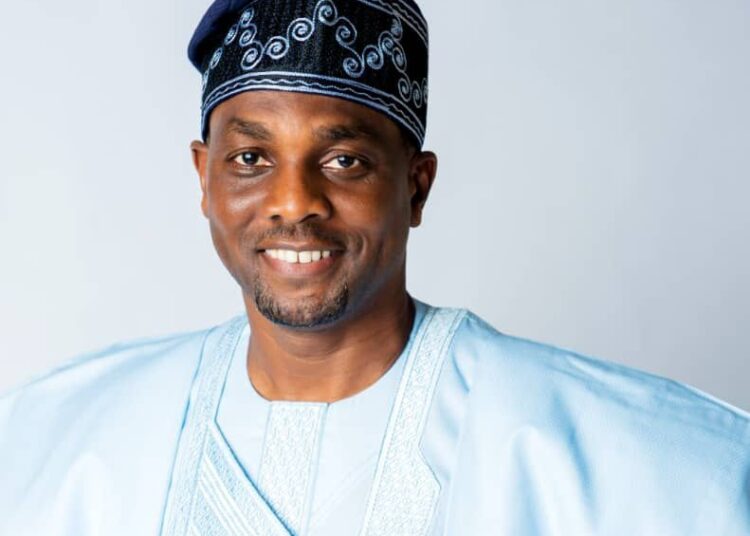Hon Olajide Boladuro is The Director General of the Oyo State Gaming Board, in this interview he spoke on challenges and achievements of his organisation.
Sir, can you kindly give an overview, from the perspective of the Board, of the growth of the gaming and lottery sector in the state
Well, sports betting in particular. I remember when I came in in 2019, we had about 20-something operators, now we’re going to about 57, of various operators in different categories. Sports betting has really grown in Oyo State. Our governor, His Excellency Seyi Makinde, has created an enabling environment holistically for business to thrive.
Not only in the gaming lottery sector but in other sectors as well. So that has invited a lot of operators do business with us in Oyo State. We make sure that they have a very good platform for them to be able to do their business when they come in. We give a lot of moratorium, a lot of time for them to acclimatize themselves with the state. So I think they like the way that we approach them. That’s one of the reasons why the new operators and even the old ones in other states want to come to Oyo State to do business.
What are some of the strategies you have in place to ensure efficient revenue collection?
As you know, we didn’t have a platform where we plug into their system, where they make payments based on a category. We have different categories. Like sports betting, for retail, we have the big ones, per the number of shops that they have, that’s how we categorize it. And that has helped us until now where we have a consultant on board that is going to be plugging into their systems so that the state can generate revenue at the actual rates from the business that they do.
So it’s a win-win situation for both the state and the operators, in the sense that we don’t overcharge them for the operation that they have not done, and they don’t underpay the state. So that is one of the ways that we have streamlined revenue collection in the sports betting arena.
Can you give an insight into some of these innovations in tax revenue collection?
So, tech for us, like you were listening to clearly during the interactive forum, a lot of operators now are leaning towards online. Retail is kind of slowing down, even though people like the one-on-one interaction when placing a bet. I mean, our citizens here, not everybody knows how to use the internet effectively, plus data cost and all those things.
The way we have been able to do that is by letting the companies know that if you are in our states, you can’t say you go and got a licence from Abuja and say you want to perform here, even though we are short-handed with some of the online companies.
But for the most part, those that know are compliant. There are a few of them that are adamant about the fact that they don’t want to be licensed by the state because they have gone to collect a federal license from the National Lottery Regulatory Commission (NLRC). There is that challenge. And that’s one of the reasons why the tussle between the federal and state government needs to be put to rest. As I mentioned earlier, there’s a case at the Supreme Court.
Again it’s explicitly spelt out in our Constitution, the 1999 Constitution of the Federal Republic of Nigeria as amended, that anything gaming or lottery is neither on the concurrent list nor the exclusive list, so that makes it a residual matter which the state should be the one to mediate. There are challenges there as far as the online companies complying with our rules and regulations in the state.
On the whole, would you say they’ve been collaborative with the board?
For the most part, yes. For the most part, we have 80 per cent compliance, which is not bad at all. We’re just hoping that the rest of them can come on board because they’re doing business in our state. That means it is only right for you to do your obligation because we not only licence and regulate just for IGR alone, we do it just for things to be smoother for our citizens as well, because if a punter stakes with an operator that is not licenced by us and something happens, how do we mediate? How do we try to proceed? If we don’t know you, we cannot track you or do the right thing by either the operator or the punter. This is why we want to continue to tell our operators who are not licensed with us to do the right thing so that everybody can be on the same page.
80 per cent compliance is quite high, but with that 20 per cent left, how does the board deal with tax evasion?
Honestly, it’s a tough challenge. We write letters. For somebody that is in your air space, and the state does not have the technology to block their IPs and whatnot? There’s almost little you can do other than file lawsuits and write them letters and try to engage them and try to use the carrot approach to the best of our ability. But I’m sure we’ve had some success with that as well. We have written to some companies and they felt the need to say, “Oh, this is wrong.” And they came on board and they’re doing the right thing, and till today they’re still with us and they’re doing the right thing.
Is there any points where you had to enforce these regulations?
They’re in our online space. It’s tough to enforce compliance on online business. The only way that we checkmate them is that they cannot advertise on our airwaves, because all the radio stations, TV stations, print media, and online media, they already know within the state, that the state will sanction them. If you ever advertise a company that doesn’t show you proof of an Oyo State Gaming and Lottery license. That’s one of the ways we used to checkmate them. They can be on the airwaves but they cannot advertise in the state.
How has the Board approached responsible gambling?
Responsible gambling for us is a major thing. Actually, It’s one of the cardinal points of His Excellency. Under 18 should not be gambling. We go out to betting shops. I will say we have a robust task force that goes to the betting houses to make sure that that is not happening. We do community outreach with a lot of advocacy with parents and guardians, but again, the only place we fall short is online. We cannot control if a child picks up their phone now, and somebody that is under 18 starts using their phone to bet. But we do awareness on the radio, on TV, and in print and online media to let them know that it’s not allowed and for the retail ones, we make sure that we are enforcing them. There are hefty fines that we impose if we ever find somebody who is under the age of 18 in your betting shop
Are there any significant challenges the Board faces?
There are always challenges. You cannot be 100 per cent. As far as the challenges that we’re facing within, from the operators, are mainly online. We are hoping to expand our operations as well, that’s within our government, to have a bigger office space, more vehicles, more personnel to be able to do our job effectively. Then we had a law that was not very robust. We have since worked on that. An amendment has been sent to the State Assembly. I’m sure once that is done, we’ll be good to go.
What about the milestones recorded since you assumed the role of Director-General of the Board?
We have quite a lot. We have been able to reduce underaged gaming to the barest minimum. That’s one of the things that we have been able to do, which I’m very, very proud of. We have been able to bring a lot of operators to come and do business in our state, again, because of the enabling environment that the governor has created. We now have a better relationship with our operators: We are not over-regulating them and they’re not underpaying us, so everybody is within the equilibrium of the law and they’re doing the right thing.
So I’m very proud of the fact that the state’s IGR has increased tremendously. We’re one of the five agencies bringing in IGR to the state per His Excellency’s sustainable development and creating that environment. These are the major achievements













